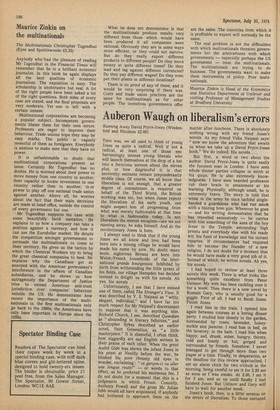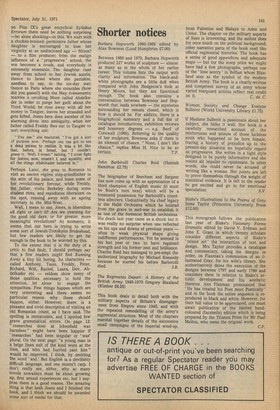Auberon Waugh on liberalism's errors
Running Away David Pryce-Jones (Weidenfeld and Nicolson £2.00)
Time was, we all used to think of young Jones as quite a radical. Well if not a radical, at least one of those embarrassingly intense young liberals who will launch themselves at the drop of a hat into a ferocious sermon about the eleven plus, or how disgraceful it is that university entrants remain preponderantly middle class. Of course, we all know that liberalism is not enough, that a greater degree of commitment is required on behalf of the Third World, the British working man etc, but when Jones rejects the liberalism of his early youth, one might suspect him of progressing from what was merely fashionable at that time to what is fashionable today. Is not liberalism the merest escapism—are we not running away, he asks himself. And lo the revolutionary Jones is born.
I always used to think that if the young Jones we all know and love had been born into a mining village he would have made his name by now. No doubt many mute, inglorious Bevans are born into Welsh/French households of the international grande bourgeoisie. Inhibited by birth from withstanding the little tyrant of his fields, our village Hampden has decided instead to delight us with his novels. Ah yes, his novels . . .
Unfortunately, I see that I have missed one of them, called The Stranger's View. It was described by V. S. Naipaul as "witty, elegant, individual," and I have far too much respect for Mr Naipaul's discernment to suppose that it was anything else. Richard Church, I see, described Quondam as "abounding in literary felicities," and Christopher Sykes described an earlier novel, Next Generation, as "a little masterpiece." It is shameful, I often think, how niggardly are our English writers in their praise of each other. When the great Andre Gide was shown the infant Jones in his pram at Neuilly before the war, he blinked his poor rheumy old eyes in wonder, exclaiming : "ce gargon-ci va aller une longue route!" — or words to that effect, as he pocketed his enormous fee. I do not doubt for a moment that this is a judgement in which Proust, Connolly, Anthony Powell and the great Mr Julian Jebb would all have acquiesced, if anybody had bothered to approach them on the
matter after luncheon. There is absolutely nothing wrong with my friend Jones's novels. As my friend Vidia Naipaul says: "now we know the adventure that await§ us when we take up a David Pryce-Jones book." We do indeed. His novels....
But first, a word or two about the author. David Pryce-Jones is quite easily the funniest man in London. I have seen whole dinner parties collapse in mirth at his quips. He is also extremely knowledgeable. I have seen bearded professors rub their heads in amazement at his learning. Physically, although small, he is extremely brave. The story is told that while in the army he once tackled singlehanded a guardsman who had run amok With a blazing bren gun. Wherever he goes — and his writing demonstrates that he has travelled extensively — he carries with him something of the aura of the boy Jesus in the Temple, astounding high priests and everybody else with his ready wit, his fund of knowledge and his instant repartee. If circumstances had required him to become the founder of a new religion, I do not doubt for a moment that he would have made a very good job of it. Instead of which, he writes novels. Ah yes, his novels .. .
I had hoped to review at least three novels this week. There is what looks like something quite excellent from Peter Ustinov. My wife has been cackling over it for a week. Then there is a new novel by Romain Gary, who is usually good for a giggle. First of all, I had to finish Jones. Finish Jones.
I read him in the train. I opened him again between courses at a boring dinner party. I studied him closely in the garden, surrounded by roses, lavender, honeysuckle and jasmine. I read him in bed, on the lavatory, in the bath. I read him when happy, sad, drunk, sober, hungry, thirsty, cold and lonely or hot, gorged and surrounded by friends. Somehow, I never managed to get through more than two pages at a time. Finally, in desperation, as the deadline for this review approached, I set an alarm clock for two o'clock in the morning, being careful to set it for 2.30 am as soon as I was awake. At 2.30, I set it for 3 am, and so on until finally I had finished Jones. But Ustinov and Gary will have to wait for another week.
Jones's book, then, is a little sermon on the errors of liberalism. To those nurtured
on Pius IX's great encyclical Syllabus Errorum there need be nothing surprising —let alone shocking—in this. We start with a chicken-brained, permissive father whose daughter is encouraged to lose her virginity at an undisclosed age — fifteen? — to a film producer; from the malign influence of a 'progressive' school, the son becomes a crook, and everybody is extremely miserable. The daughter runs away from school to her Jewish auntie, thence to Israel where she partakes, needless to say, in the six-day war; thence to Paris where she coincides (how did you guess?) with the May evenements; marries a ievolting Moor called Abdelkader in order to purge her guilt about the Third World; he runs away with all her money in Tangier, leaves her stranded and gets killed. Jones here does another of his alarming dives into ambiguity, when her father called Freddy flies out to Tangier to sort everything out: "You see," she hesitated, "I've got a sort of purpose now. Perhaps one has got to see a dead person to realize. It was a bit like that, before, in Israel, but I couldn't grasp it. Well, I mean," halting, "I must fight for justice, now, mustn't I, and equality, and all the things Abdelkader believed in."
Perhaps. Later, she goes to Romania to visit an ancien regime step-grandfather in the attic of his palace, and loses some of her revolutionary fervour, while 'Freddy, the father, visits Berkeley during some student riots, and repudiates liberalism on the spot, running away with an ageing secretary to the Mid-West.
Well, I mean to say, Jones, is liberalism all right or isn't it? Are we yearning for the good old days, or for greater, more meaningful revolutions? At moments, it seems that our hero is trying to write some sort of Jewish-Trotskyite Brideshead, but few readers are likely to get far enough in the book to be worried by this.
To the extent that it is the duty of a critic to find fault, I should perhaps say that a few readers might find Running Away a tiny bit boring. Its characters — called Anthony, Tanis, Freddy, Peter, Richard, Will, Rachel, Laura, Dov, Abdelkader etc — seldom show many of those qualities necessary to hold the attention, let alone to engage the sympathies. Few things happen which are very interesting and there seems no particular reason why these should happen, either. However, there is a pleasant and vivid description of visiting an old Romanian count, as I have said. The spelling is immaculate, and I spotted few grave grammatical errors. On page 12: "researches done at Ickenfield was harmless" might have been happier if ' researches ' had been singular or 'was' plural. On the next page: "a young man in a beige linen suit of the kind worn at the time, and who had hurried past him" would be improved, I think, by omitting the word ' and.' But English is a devilishly difficult language, and one mustn't carp. I don't really see, either, why so many novels nowadays must be about growing up, first sexual experiences etc, but I suppose there is a good reason. The amazing thing is that both Jones and I finished the book, and I think we should be awarded some sort of medal for that.











































 Previous page
Previous page